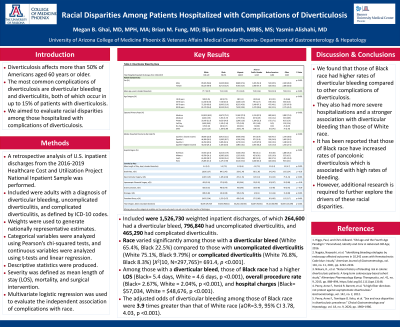Monday Poster Session
Category: Colon
P1618 - Racial Disparities Among Patients Hospitalized With Complications of Diverticulosis
Monday, October 23, 2023
10:30 AM - 4:15 PM PT
Location: Exhibit Hall

Has Audio

Megan B. Ghai, MD, MPH, MA
University of Arizona College of Medicine
Phoenix, AZ
Presenting Author(s)
Megan B. Ghai, MD, MPH, MA1, Brian M.. Fung, MD1, Bijun S. Kannadath, MBBS, MS1, Yasmin Alishahi, MD2
1University of Arizona College of Medicine, Phoenix, AZ; 2University of Arizona, Phoenix, AZ
Introduction: Diverticulosis affects more than 50% of Americans aged 60 years or older. The most common complications of diverticulosis are diverticular bleeding and diverticulitis, both of which occur in up to 15% of patients with diverticulosis. We aimed to evaluate racial disparities among those hospitalized with complications of diverticulosis.
Methods: A retrospective analysis of U.S. inpatient discharges from the 2016-2019 Healthcare Cost and Utilization Project National Inpatient Sample was performed. Included were adults with a diagnosis of diverticular bleeding, uncomplicated diverticulitis, and complicated diverticulitis, as defined by ICD-10-CM codes. Weights were used to generate nationally representative estimates. Categorical variables were analyzed using Pearson’s chi-squared tests, and continuous variables were analyzed using t-tests and linear regression. Descriptive statistics were produced. Severity was defined as mean length of stay (LOS), mortality, and surgical intervention. Multivariate logistic regression was used to evaluate the independent association of complications with race.
Results: Included were 1,526,730 weighted inpatient discharges, of which 264,600 had a diverticular bleed, 796,840 had uncomplicated diverticulitis, and 465,290 had complicated diverticulitis. Race varied significantly among those with a diverticular bleed (White 65.4%, Black 22.5%) compared to those with uncomplicated diverticulitis (White 75.1%, Black 9.79%) or complicated diverticulitis (White 76.8%, Black 8.3%) [X2(10, N=297,765)= 691.4, p < 0.001]. Among those with a diverticular bleed, those of Black race had a higher LOS (Black= 5.4 days, White = 4.6 days, p < 0.001), overall procedure rate (Black= 2.67%, White = 2.04%, p < 0.001), and hospital charges (Black= $57,034, White = $48,676, p < 0.001). The adjusted odds of diverticular bleeding among those of Black race were 3.9 times greater than that of White race.
Discussion: We found that those of Black race had higher rates of diverticular bleeding compared to other complications of diverticulosis. They also had more severe hospitalizations and a stronger association with diverticular bleeding than those of White race. It has been reported that those of Black race have increased rates of pancolonic diverticulosis which is associated with high rates of bleeding. However, additional research is required to further explore the drivers of these racial disparities.
Disclosures:
Megan B. Ghai, MD, MPH, MA1, Brian M.. Fung, MD1, Bijun S. Kannadath, MBBS, MS1, Yasmin Alishahi, MD2. P1618 - Racial Disparities Among Patients Hospitalized With Complications of Diverticulosis, ACG 2023 Annual Scientific Meeting Abstracts. Vancouver, BC, Canada: American College of Gastroenterology.
1University of Arizona College of Medicine, Phoenix, AZ; 2University of Arizona, Phoenix, AZ
Introduction: Diverticulosis affects more than 50% of Americans aged 60 years or older. The most common complications of diverticulosis are diverticular bleeding and diverticulitis, both of which occur in up to 15% of patients with diverticulosis. We aimed to evaluate racial disparities among those hospitalized with complications of diverticulosis.
Methods: A retrospective analysis of U.S. inpatient discharges from the 2016-2019 Healthcare Cost and Utilization Project National Inpatient Sample was performed. Included were adults with a diagnosis of diverticular bleeding, uncomplicated diverticulitis, and complicated diverticulitis, as defined by ICD-10-CM codes. Weights were used to generate nationally representative estimates. Categorical variables were analyzed using Pearson’s chi-squared tests, and continuous variables were analyzed using t-tests and linear regression. Descriptive statistics were produced. Severity was defined as mean length of stay (LOS), mortality, and surgical intervention. Multivariate logistic regression was used to evaluate the independent association of complications with race.
Results: Included were 1,526,730 weighted inpatient discharges, of which 264,600 had a diverticular bleed, 796,840 had uncomplicated diverticulitis, and 465,290 had complicated diverticulitis. Race varied significantly among those with a diverticular bleed (White 65.4%, Black 22.5%) compared to those with uncomplicated diverticulitis (White 75.1%, Black 9.79%) or complicated diverticulitis (White 76.8%, Black 8.3%) [X2(10, N=297,765)= 691.4, p < 0.001]. Among those with a diverticular bleed, those of Black race had a higher LOS (Black= 5.4 days, White = 4.6 days, p < 0.001), overall procedure rate (Black= 2.67%, White = 2.04%, p < 0.001), and hospital charges (Black= $57,034, White = $48,676, p < 0.001). The adjusted odds of diverticular bleeding among those of Black race were 3.9 times greater than that of White race.
Discussion: We found that those of Black race had higher rates of diverticular bleeding compared to other complications of diverticulosis. They also had more severe hospitalizations and a stronger association with diverticular bleeding than those of White race. It has been reported that those of Black race have increased rates of pancolonic diverticulosis which is associated with high rates of bleeding. However, additional research is required to further explore the drivers of these racial disparities.
Disclosures:
Megan Ghai indicated no relevant financial relationships.
Brian Fung indicated no relevant financial relationships.
Bijun Kannadath indicated no relevant financial relationships.
Yasmin Alishahi indicated no relevant financial relationships.
Megan B. Ghai, MD, MPH, MA1, Brian M.. Fung, MD1, Bijun S. Kannadath, MBBS, MS1, Yasmin Alishahi, MD2. P1618 - Racial Disparities Among Patients Hospitalized With Complications of Diverticulosis, ACG 2023 Annual Scientific Meeting Abstracts. Vancouver, BC, Canada: American College of Gastroenterology.
